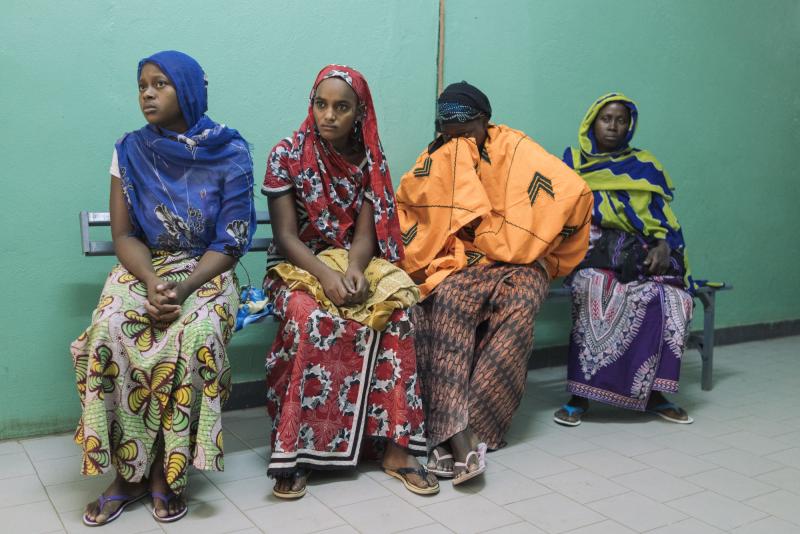Where We Work
See our interactive map


Fistula clients wait in line for repair surgeries at Kayes Hospital, Mali. The study identified high levels of mental distress and other negative fistula-related experiences among participants, such as disturbing memories, financial dependence, and isolation. Photo by Nana Kofi Acquah for IntraHealth International.
Data from a pilot study in Mali are helping the country provide more holistic fistula care to women and girls.
Like most global health researchers, I want my work to have the broadest possible reach and greatest possible impact. That’s why, when I had the serendipitous opportunity to partner with IntraHealth International to share the lessons I’d learned through my obstetric fistula research in Tanzania, I jumped on it.
Obstetric fistula results from prolonged obstructed labor or a perforation made during a caesarean section. The condition primarily affects women in low-resource settings who don’t have access to emergency obstetric care. Its devastating physical and emotional effects—uncontrollable leakage of urine and/or feces, nerve damage, infections, shame, isolation and stigma, to name just a few—are well-documented through research. However, until a few years ago, no evidence-based mental health interventions had been developed for this population.
To help address this gap, I conducted a pilot study on a nurse-delivered mental health intervention for obstetric fistula patients in collaboration with colleagues at Duke University and the Kilimanjaro Christian Medical Center in Moshi, Tanzania. The findings suggested that the intervention, developed through formative research with local stakeholders and based on psychological theory, was well received by the patients, led to positive mental health outcomes and was delivered successfully by a nurse-level facilitator.
In fact, one of the study’s most important takeaways was that it supports the feasibility of “task-shifting” mental health care to non-mental health professionals in a hospital setting.
Together, we created an instrument to collect indicators of mental distress and take stock of the social impacts of fistula.
Shortly after we wrapped up the study, my colleague, Joy Noel Baumgartner, director of the Evidence Lab at the Duke Global Health Institute, saw a potential synergy between my obstetric fistula research in Tanzania and IntraHealth’s work on delivering obstetric fistula care in Mali—which she’d heard about through professional networks. It was an opportune connection that exemplifies the Evidence Lab’s focus on disseminating new evidence to increase the impact of an intervention.
The IntraHealth-led project, Fistula Mali, is increasing access to fistula repair services across Mali; empowering health workers to diagnose, treat and prevent the condition; and increasing community knowledge and reducing fistula-related stigma.
I was eager to learn more and work with a local NGO on a research topic I care deeply about. With Joy Noel’s help in connecting me with Maureen Corbett and her team, it wasn’t long before we were huddling at the IntraHealth office trying to figure out how we could collaborate to extend and enhance the care provided to women suffering from obstetric fistula.
Because of my experience in Tanzania, we quickly homed in on opportunities to lay the groundwork for incorporating a mental health component into the Fistula Mali programming. IntraHealth’s goal was to establish evidence to help them advocate for mental health resources for fistula patients in Mali.
Together, we created an instrument that would collect indicators of mental distress and take stock of the social impacts of fistula. The survey was designed to assess the mental health and well being of all women clients prior to fistula repair and then again three to six months post-surgery. We also assisted IntraHealth in developing a training protocol and a referral and support system for women with fistula.
The data make a strong case for providing psychosocial support to fistula patients in Mali.
My main role in the collaboration was to manage, analyze, and present the data IntraHealth was collecting. I recruited a French-speaking undergraduate global health major, Thuy-Vi Nguyen, to assist with this process. Not surprisingly, we identified high levels of mental distress and other negative fistula-related experiences, such as disturbing memories, financial dependence, and isolation, among the study participants. The data make a strong case for providing psychosocial support to fistula patients in Mali.
While the findings were squarely in line with other similar studies, conducting the research in Mali was a critical step. Local data, I’ve learned, matters when advocating for local resources. And the study also demonstrated that data collection can be easily integrated into existing fistula service routines in Mali.
IntraHealth is now equipped with data to share with key stakeholders to support their efforts to provide holistic fistula care to women in Mali.
And in fact, this is already happening, with notable results. Based on our study, the Malian government’s “Strategic Plan for the Elimination of Obstetric Fistula in Mali (2018-2022)” now mentions the “remarkable innovative strategy” of assessing the mental health status of women affected by fistula.
My work with IntraHealth—and its tangible positive outcomes—has inspired me to actively seek out opportunities to broaden the impact of my research by partnering with organizations who are engaged in providing health care services to people in low-resource communities across the world.
And lucky for me, my home state of North Carolina is home to more than 200 organizations and companies working to improve global health—so my next opportunity may be just around the corner.
Fistula Mali is led by IntraHealth International and funded by the US Agency for International Development.
This post originally appeared on the Duke Global Health Institute website.
Get the latest updates from the blog and eNews




